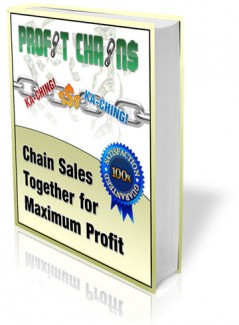 License Type: Personal Use
License Type: Personal Use  File Size: 439 KB
File Size: 439 KB File Type: ZIP
File Type: ZIP
 SKU: 55133
SKU: 55133  Shipping: Online Download
Shipping: Online Download
Ebook Sample Content Preview:
The Free Lifetime Upgrade Chain
For some of my more expensive products I offer free lifetime upgrades as a bonus to increase sales. Of course, a customer has to stay on the mailing list for that product if they want to be notified when a free upgrade is available.
And it makes sense, right? If they remove themselves from the mailing list I have no way to email them with an upgrade notice.
When I notify them that a free upgrade is ready, I also make sure I have a new product to offer. A little bit clever, don't you think? ©
Since they're likely happy to be getting a free upgrade when I write to them, they'll be about as receptive as they can be to hearing about a new product. If the new product also comes with free lifetime upgrades, it's an especially great selling point since they just got a free upgrade for a previous purchase.
If the new product is about a topic they are interested in and it's priced right, it's a hard offer to resist if they were happy with their previous purchase.
You could also market directly to this list, but I'd be cautious about it. They didn't buy your product to receive marketing emails. That's a common practice, but this is a little bit different. Here's why...
Because they have to stay on your list to get free upgrades, too many emails can feel like they're being taken advantage of - sort of like being held hostage - and that can lead to resentment.
Personally, I only market to these lists when I have an upgrade to offer, but here's a key point—unless your product is perfect and perfectly complete, it usually isn't that hard to come up with a decent upgrade, and without spending an inordinate amount of time doing it.
You can also send out a free bonus product instead of an upgrade. Let them know you're offering it as a new bonus to their previous purchase and they'll be happy to receive it, and then you can introduce your new commercial product with at the same time.
When folks feel like they're getting more value than they expected, it makes them more receptive to buying again.
The Comparison Chain
Comparison chains are basically two link chains, used in product reviews or website content. Here's what a comparison chain is about.
Find a product similar to a product of your own that has an affiliate program. The product can be more expensive or less expensive than yours, but should not be the same price.
Then write an article or review comparing the two products. If you use in-context links in the body of your product comparison it can help with the search engines as well as increase sales.
You can make the more expensive product look best by touting all the features and benefits it has that the other doesn't, or make the lesser cost product look best by extolling a similar value at a lower cost—it
just depends on which product is yours or which product you want to see the most sales from.
Warning! Never badmouth a competitor's product. Your motives will be seen as disingenuous and self-serving, which many, if not most people, will dislike. The result is that many of them will immediately distrust you.
It's important to use just two products and present them as the best two options. If you use more than two products, it just muddies the water. The reader may then decide to leave your site to look for more information to find clarity.
I like to find products that cost more than mine when I use this tactic. It makes mine seem like a bargain by comparison, which results in more sales. However, if you have a clearly superior product it can work in the opposite way.
If someone does choose the more expensive affiliate product, you still win because you'll get a nice, fat commission. If you choose your comparison product well your commission can earn more money for you than you'd make from selling your own product.
This strategy doesn't have to apply to your own products, or even to ebooks. You can apply it to software, hosting, or any type of products or services that have affiliate programs. You could also compare two of your own products if you have a low cost version of an expensive product. You can't lose that way.
You can even do a comparison between two affiliate products. Have you ever noticed when an affiliate reviews a product, they seldom, if ever, do a review comparison? It's true.
Suppose I was interested in Joe's Widget and Jane's Thingamajig. Most sites will review one or the other. A few may review both in separate articles. Few will do a side-by-side comparison on the same page. That can be the difference maker.
There are many ways you can approach comparing products, whether your own products, affiliate products, or one to the other. Here are a three ideas to spark your imagination...








